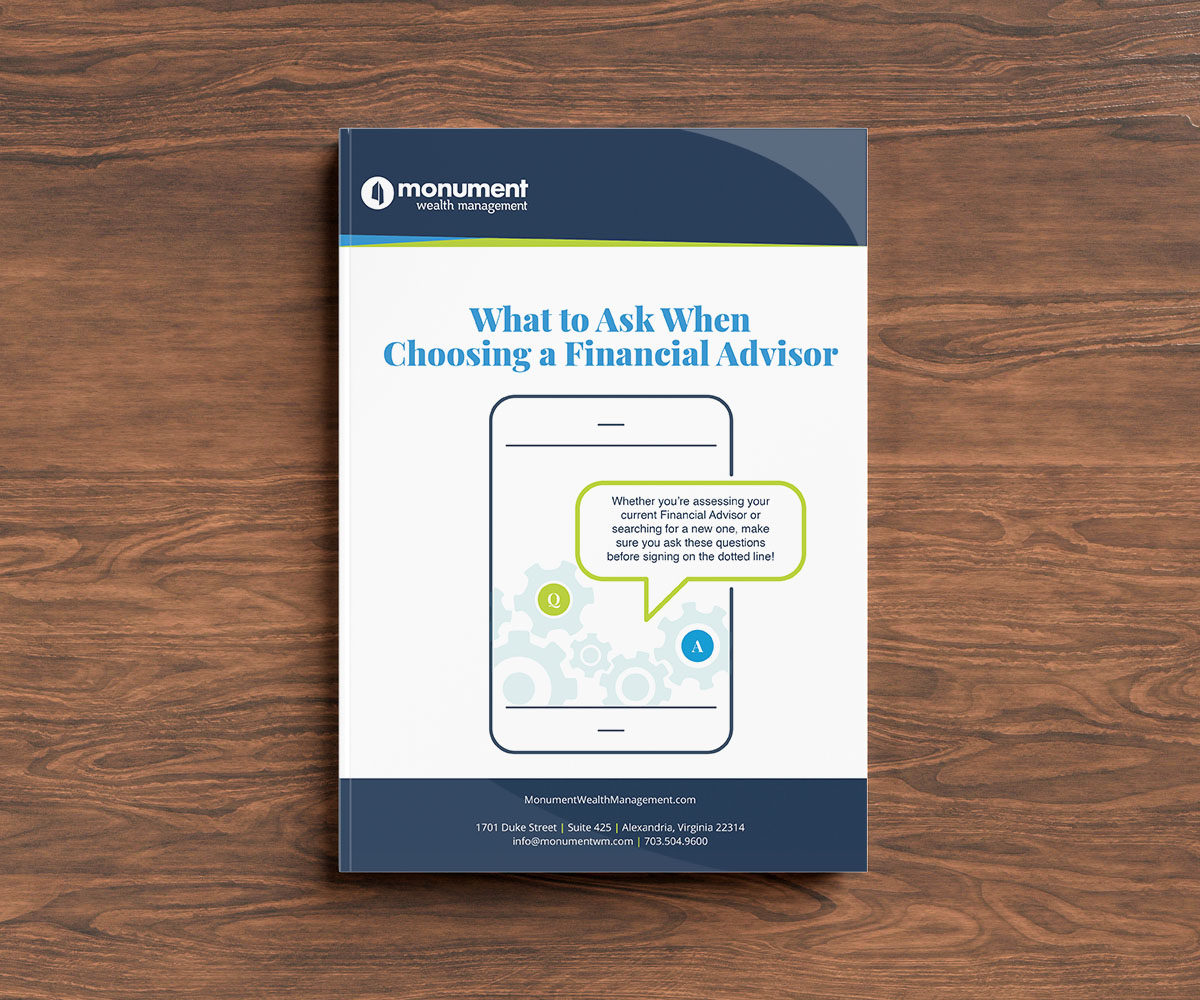Monument Wealth Management Articles
Anxiety-Proof Retirement: Understanding Your Retirement Income Sources

Share on your favorite platform, or by email
What do planning for retirement and cooking have in common? If you are like me and enjoy time in the kitchen (my love language is food), you probably embrace the concept of “mise en place” – or in plain English “putting in place” before you dive in to a new recipe. It makes for a more enjoyable culinary process – heat plus sharp knives plus dogs running under my feet are a recipe for disaster if I don’t get organized from the start.
Planning for retirement isn’t so different…there are many components that need to come together in order to have a successful and enjoyable transition to a life without a conventional paycheck. It may sound overwhelming, but with a solid gameplan, you can anxiety-proof retirement by knowing what retirement income sources you have and how they will contribute to your “What’s the Money For” recipe.
Know What’s Fixed
One of the biggest challenges for people entering retirement is knowing how to start spending from their portfolios when they’ve spent an entire life saving. How do you even know where to begin to make sure you can do what you want, when you want, without the risk of running out of money?
A good first step is taking stock of how much set income you will have in retirement from sources other than your portfolio. While nothing is ever truly “guaranteed” retirement income, you can start to get a good idea of how much to reliably expect each year from things like Social Security, pensions, veterans benefits, and annuities with income riders that provide a contractual amount of income.
Tallying up the amounts from these different sources can provide a better understanding of how much you actually need to withdraw from your investment accounts versus relying on things like rules of thumb (4% rule anyone?) or generalizations. This can go a long way in reducing the risk of outliving your portfolio, allowing better tax planning, and most importantly eliminating anxiety of the unknown.
Know Your Timelines
Figuring out how much set income you can get outside of your portfolio sounds pretty simple, but knowing when those different sources of income kick in or when it is ideal to start taking certain types of income can be more complicated. Just because you CAN claim income at certain milestone dates or ages, doesn’t mean you SHOULD. Here’s a few things to keep in mind:
Retirement Accounts & Penalties
In most cases, you must be at least age 59 ½ to withdraw money from retirement accounts (both 401k accounts and IRAs) without an early withdrawal penalty of 10%. There are exceptions if you retire between 55 and 59 ½ and have a 401k plan at the job you retired from. If you plan to retire in your fifties, you will need to consider:
- Whether you have enough funds in the 401k plan with the company you will retire from or elsewhere to cover your expenses before you can start receiving other income, like Social Security and penalty-free withdrawals from IRAs.
- Balancing your saving and investing between tax-advantaged retirement accounts and general “taxable” investment accounts that don’t have rules surrounding when you can make withdrawals. Ideally you should be thinking about this well before you intend to retire to ensure you are setting your future self up for success…and you don’t have to go it alone. Working with a wealth advisor who understands your big picture gives you clarity on what actions to take now to get you where you want to go.
Social Security
You can start receiving Social Security income as early as age 62. However, if you choose to receive Social Security before your Full Retirement Age (driven by your birth year) the amount of income you receive will be permanently reduced.
- If you are planning with a spouse, there are additional timing considerations to make sure that you maximize your combined benefits and ensure optimal income for a surviving spouse.
- A wealth advisor can simplify this process, helping you understand all of your options and why it’s worth considering one over another based on your unique goals and objectives.
Required Minimum Distributions (RMDs)
Based on current laws, you must withdraw a minimum amount each year from pre-tax retirement accounts beginning at age 72. The actual amount will depend on the balance in your IRA and your age each year (but it’s usually around 3% or so).
- Because these distributions are considered taxable income, planning should be done in advance of retirement to determine the right mix of accounts to tap into each year to meet income needs before and after age 72.
- Much like with mise en place in cooking, creating your roadmap for income with a wealth advisor in advance of retirement will help make sure retiring is actually an enjoyable experience and reduce the risk of outcomes that take you off course.
How Does an Investment Portfolio Become an Income Source?
Knowing how much income you need and when you need it is the easy(ish) part. Knowing how to start using your investment portfolio to meet the difference between your planned spending and your set income is harder.
There are about as many opinions out there on what’s “best” as there are recipes for chicken – nobody can really tell you they have the answer for you without a deep understanding of your big picture and financial circumstances. While there are many approaches to tapping into a portfolio in retirement, here are a few things to keep in mind:
Passive Income Investments
A well-diversified portfolio may include investments that produce a “passive” income stream, meaning you receive income just by owning stock in a company that pays a dividend or owning bonds that have a set coupon payment. There are many types of income-producing investments that can be considered depending on your goals, personal circumstances, and risk tolerance.
- When you are far away from retirement and in saving mode (i.e. accumulating assets), you might reinvest this income, but as retirement nears, passive income becomes a nice supplement to your set sources of income.
- You can’t just end up with an income-producing portfolio overnight (at least not without incurring capital gains to reallocate/realign your portfolio with your goals). It literally pays dividends to plan ahead for your income needs when making investment allocation decisions in the years leading up to retirement.
Selling Investments
You can sell investments in your portfolio to create cash for your spending needs.
- We believe that cash is king – in case you need withdrawals from your portfolio to meet short-term spending needs, you should always have 12-18 months of cash to ensure you can get through rough patches in the market without losing sleep at night.
- There’s no hard and fast rule on what kinds of accounts (taxable or tax-deferred retirement accounts) are “best” to withdraw from. The answer depends on your situation – there may be tax reasons to withdraw from a combination of taxable and tax-deferred accounts or your unique estate plan may dictate what’s best. A wealth advisor is a valuable partner in helping you determine what’s best for you and adapting your plans over time based on the reality of a changing world.

No one can deliver tomorrow to you today – which can be unsatisfying and uncomfortable when it comes to planning for retirement income and the natural human desire for certainty. Real security comes from knowing you have a solid plan in place, much like great outcomes in the kitchen come from preparing in advance.
Not sure you have a solid plan to anxiety-proof your retirement? Talk to us about Private Wealth Design and creating a blueprint for your future retirement. At Monument, our clients benefit from our deep understanding of their big picture and the solid plans that result from our collaborative, customized approach of turning a wealth of resources and investments into a design representing the life they want to live.

Choosing a Financial Advisor Can be Overwhelming…Here Are 7 Questions to Ask…
Ready for straightforward, unfiltered opinion and tailored advice for YOUR questions, not everyone else’s?
Recent Awards & Press
By Emilie Totten
IMPORTANT DISCLOSURE INFORMATION
Please remember that past performance is no guarantee of future results. Different types of investments involve varying degrees of risk, and there can be no assurance that the future performance of any specific investment, investment strategy, or product (including the investments and/or investment strategies recommended or undertaken by Monument Capital Management, LLC [“Monument”]), or any non-investment related content, made reference to directly or indirectly in this blog will be profitable, equal any corresponding indicated historical performance level(s), be suitable for your portfolio or individual situation, or prove successful. Due to various factors, including changing market conditions and/or applicable laws, the content may no longer be reflective of current opinions or positions. Moreover, you should not assume that any discussion or information contained in this blog serves as the receipt of, or as a substitute for, personalized investment advice from Monument. To the extent that a reader has any questions regarding the applicability of any specific issue discussed above to his/her individual situation, he/she is encouraged to consult with the professional advisor of his/her choosing. No amount of prior experience or success should be construed that a certain level of results or satisfaction will be achieved if Monument is engaged, or continues to be engaged, to provide investment advisory services. Monument is neither a law firm nor a certified public accounting firm and no portion of the blog content should be construed as legal or accounting advice.
A copy of Monument’s current written disclosure Brochure discussing our advisory services and fees is available for review upon request or at www.monumentwealthmanagement.com/disclosures. Please Note: Monument does not make any representations or warranties as to the accuracy, timeliness, suitability, completeness, or relevance of any information prepared by any unaffiliated third party, whether linked to Monument’s website or blog or incorporated herein, and takes no responsibility for any such content. All such information is provided solely for convenience purposes only and all users thereof should be guided accordingly.
Historical performance results for investment indices, benchmarks, and/or categories have been provided for general informational/comparison purposes only, and generally do not reflect the deduction of transaction and/or custodial charges, the deduction of an investment management fee, nor the impact of taxes, the incurrence of which would have the effect of decreasing historical performance results. It should not be assumed that your Monument account holdings correspond directly to any comparative indices or categories. Please Also Note: (1) performance results do not reflect the impact of taxes; (2) comparative benchmarks/indices may be more or less volatile than your Monument accounts; and, (3) a description of each comparative benchmark/index is available upon request.
Please Remember: If you are a Monument client, please contact Monument, in writing, if there are any changes in your personal/financial situation or investment objectives for the purpose of reviewing/evaluating/revising our previous recommendations and/or services, or if you would like to impose, add, or to modify any reasonable restrictions to our investment advisory services. Unless, and until, you notify us, in writing, to the contrary, we shall continue to provide services as we do currently. Please Also Remember to advise us if you have not been receiving account statements (at least quarterly) from the account custodian.
